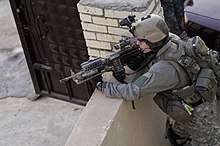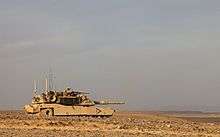Overwatch (military tactic)
Overwatch is a force protection tactic in modern warfare where one small unit or military vehicle supports another while it is executing fire and movement tactics. An overwatching unit takes a position where it can observe the terrain ahead, especially likely enemy positions. This allows it to provide effective covering fire for advancing friendly units. The term "overwatch" was coined in U.S. military doctrine in the 1950s.[1]

| Part of a series on |
| War |
|---|
|
|
|
Related
|
Execution
An ideal overwatch position provides cover for the unit, and unobstructed lines of fire. It may be on a height of ground or at the top of a ridge, where a vehicle may be able to adopt a hull-down position. If the overwatching unit is in a position to fire over advancing friendly units, great care must be taken not to let fire fall short. The friendly units should be within tracer round burnout.

Overwatch can be performed by platoons during company fire and movement; individual armoured fighting vehicles (especially tanks) or infantry sections; in platoon fire and movement; or by fireteams or individual soldiers in the final stages of an assault.
Overwatch tactics and 'firing at the short halt' were especially important in armoured warfare before modern tank gun stabilizers were developed, since moving tanks were unlikely to hit any target. Even in modern tanks, however, it is much easier to spot enemies at a halt.
See also
References
- William Safire (14 October 2007). "On Language - Overwatch". New York Times. Retrieved 21 November 2015.